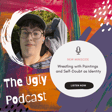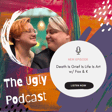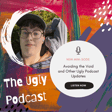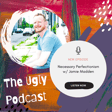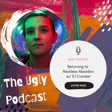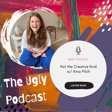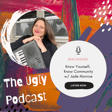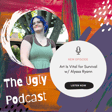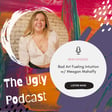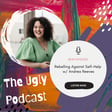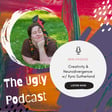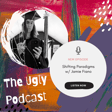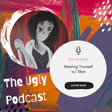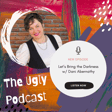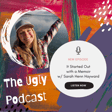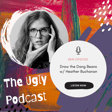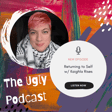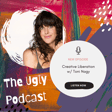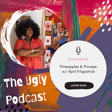Embracing Messy Art and the Inner Critic
00:00:04
Speaker
Welcome to The Ugly Podcast, the place where creatives are encouraged to make messy, ugly art and to redefine their relationship to their inner critic. Every other week, I am joined by creatives of all mediums and methods to discuss our creative processes and how we navigate the mental minefield of creativity. This podcast serves as a reminder that you and your art get to be whatever the hell you want to be. Ugly out.
Introduction: Lauren and Em's Artistic Exploration
00:00:31
Speaker
Welcome back to The Ugly Podcast. I'm your host, Lauren Alexander. I use they, them pronouns as you know. And I have a new guest for you all today. My guest is somebody who uses art and technology to explore disability as a hotbed of innovation. Welcome. Will you please introduce yourself with your name and pronouns, please? Hi, I'm Em. I use they, them pronouns.
00:00:59
Speaker
I'm sorry, am I Fleur? I do possess a last name. Do you do visual description on your podcast? I haven't, but I should. I should start doing that. Yes. So I am a light skinned, tall person wearing chunky headphones, big blue glasses, I have very ruddy cheeks, and I'm wearing a big fluffy winter outfit.
00:01:25
Speaker
Amazing. Oh, fluffy winter. That's what we need right now. It's so cold. Well, you're you might be a little warmer down there, but maybe not. You can correct me if I'm wrong. San Francisco is cold, but not freezing. That's pleasantly cold, pleasantly cold, cold enough to keep all the windows open, in my opinion. Yeah, here it is. Thirty five degrees outside.
Creativity, Accessibility, and Innovation
00:01:54
Speaker
I'm so grateful that you're here and also just that I stumbled across you on Instagram and just especially your art school from bed series I think so for a little bit about me I I never used to think I was a creative person because I had this vision of what creative people did what they looked like and
00:02:17
Speaker
what they acted like, what they made. And I was like, I'm none of those things. So I am not creative. And what I just love so much that you're like, no, none of that's all bullshit. We don't want any of that. We want creativity to be innovative and new and accessible. And I just love that so much. Yeah, there's
00:02:45
Speaker
I think we often get stuck in like the, is it art with a capital A? Is it dance with a capital D? Like, is it music? Do you have an audience, especially now with, you know, internet life being so central to all of our experiences? You can sort of get caught up in like, what niche do you fill? And, and how does the algorithm perceive your work? Like there's a lot of ways that we sort of box in what we consider like,
00:03:11
Speaker
creative aspects of our lives. And I am just interested in ways that people act in creative and interesting ways that don't apply specifically to I am doing art now.
Constraints as Creative Catalysts
00:03:25
Speaker
Right. Yeah, often. And if you'd like to read more about this, there's a book called activist affordances, but generally, like in disabled lives, you are sort of forced by the constraints of your own body and environment to
00:03:41
Speaker
create a world for yourself that specifically works for your body. If you can't bend your wrist, what is the dance that you invent to put the coffee cup on the table? And if you've come up against a lot of constraints in your life and not just disabled people, everybody has constraints in their life and those constraints and working with them are sort of how we start
00:04:06
Speaker
Uh, approaching our own creative practice. And then, you know, you might build it out from there. You might learn like, Oh, well, I find this really interesting and I want to highlight that. And you sort of work from there, but the idea that we have to like work from skill in drawing realistically, like towards something and call that art. I'm like, no, thank you. Let's start from, like, let's start from everyone's individual body and sort of build up from there a language of art and creativity and, uh,
00:04:37
Speaker
community and how we use those things to like speak about ourselves to each other. Yeah. Yeah, I love all of that so much. And also like
00:04:50
Speaker
If you do not have a disability now, or you do not have that experience at the moment, we all have very fragile bodies. And we will all experience disability at some point in our lives, unless you die very suddenly and tragically, in which case, maybe not. But disability is in all of our futures, and if you can
00:05:13
Speaker
see your creativity as something that can change and move with you, then it just opens up so much more like hope and wonder and like, oh, disability isn't some big scary thing that I have to avoid at all costs or feel shame or closed off because it's in my life.
Disability as a Lens for Understanding Oppression
00:05:31
Speaker
No, it can enrich my creativity and I can access all of these different things that I never thought I could before. I think that's just so special and wonderful for all of us.
00:05:42
Speaker
And I think disability has, at least for me, has become this way of thinking about all forms of oppression. Because most forms of oppression live in our bodies. They come to us because of something about our bodies.
00:06:03
Speaker
whether that's your gender or your skin color or your height or like there's a lot of ways that people experience oppression that is generated from how other people experience their bodies and disability justice and disability studies have spent a long time thinking about this vast diversity of the ways that people experience disability and how those different experiences of like
00:06:29
Speaker
the diversity of how you can be a human and how those things work together to form disability identity as the big thing that when you say you're disabled, you're sort of opting into a political identity almost. But how it relates to not just intersectionality, but almost as an umbrella for all bodies to be welcomed in.
Art School from Bed: A New Perspective
00:06:52
Speaker
And if you don't currently experience yourself as disabled,
00:06:57
Speaker
Why is that? What is it about your built environment and about your informational environment about like the world around you that has been built very specifically for bodies just like yours. And that's why I developed art school from bed was because
00:07:16
Speaker
I went to art school. I have a master's degree in fine art. And let me tell you, they were not real interested in building accommodations specifically for like me and my art practice, even to the extent that like work I built was called not art. Like I was told my work wasn't art. Wow. Which I was like, that's real interesting perspective that you got there. What?
00:07:46
Speaker
I'm so curious, do you mind sharing the context of that situation? Or like what? Yeah, I was like, in grad school, you tend to go through these like review processes and the professors sort of like give you feedback on the projects that you're making. And you can like pass or not pass one of these reviews depending on like certain rubrics. And in my final review, like my graduation review, my entire degree is hanging on this.
00:08:15
Speaker
one of the professors that was like responsible for like whether or not I got to graduate decided that the work that I was building, which was essentially a video game you couldn't win. It's just an environment that you walked around in that slowly decayed as you walked around in it. There was no, you couldn't win it. Like it was just, you know, it was a, but it was like a virtual environment that you walked around in. And now today people would be like, yeah, like that's, you know, digital work about the body, like,
00:08:45
Speaker
decaying like that's definitely art but at the time you know in 2011 it wasn't quite like uh using digital media one was like not something they really understood and then another like oh well this is about like my experience as a disabled person was also just like no this is you're doing activism
00:09:06
Speaker
uh or you're you're you're making video games as an activism this is an art as if yeah as if activism and art are completely separate what yeah so i experienced you know their view of like who i was and what my body meant to them uh and i realized like oh
00:09:30
Speaker
There's no way I could be the only person experiencing this. Yeah. So for a long time in my art practice, I've been developing like simulations and models and prosthetics to try and understand disabled and autistic specifically, because I'm autistic.
00:09:49
Speaker
ways of knowing and ways of being, things that are non-verbal, things that are new taxonomies, all these different kinds of ways of building knowledge in my art practice. And then recently I decided that I wanted to teach art, but I wanted to teach it from the perspective of someone who
00:10:12
Speaker
is disabled and is interested in how other people how other disabled people build their own world so I wanted to start teaching art skills from like that perspective and bringing in people's very important to me like world knowledge like what do you know about the world that no one else does because of your body and your experience of the world through that body so I started trying to like I'm experimenting now like how do I teach art
00:10:42
Speaker
without saying like I am the arbiter of creative practice and you student shall come to me and I shall give unto you the wisdom and I shall also judge you as to whether or not what you're doing is correct like I'm not interested in that and that's really what I got in grad school yeah so I wanted so that's what I'm experimenting now with art school in bed it's just how how do you
Experimentation and the Purpose of Mistakes
00:11:06
Speaker
not just teach art practice, but identify creative practices people are already doing, encourage it and help people define their own personal creative practice as art. Yeah. Yeah, that is. Yeah, I'm just I'm soaking it all in. I love it. I
00:11:29
Speaker
That's kind of what I've been trying to do as well with like this ugly art practice and encouraging people to make ugly things. It's not that I need you to just make bad art, it's that I need you to experiment and be willing to go to that place where you think, no, this isn't, this can't possibly be art and say, well, what if it is? What if me scribbling on this page is art? What if that is exactly what it's supposed to be?
00:11:57
Speaker
And what are the goals of your art practice? If the goal of your art practice is to make beautiful illustrations that you can sell easily to a company so that they can use those illustrations on their website, like it's a very particular kind of art and a very particular kind of need. And there are established practices for how to develop that skill. But
00:12:25
Speaker
If, like for me, my art practice is definitely, well, what happens when you mush these two things together? Yeah. So I'm not, there is no judgment to say that like one of those is better or worse. Yeah. But in order to find and develop new like, um, established paradigms of art making, you have to like do a bunch of stuff that doesn't work.
00:12:48
Speaker
yeah it's like turning into a mad scientist of art yes yeah and i actually think that using like scientific method like in art practice is like a very fruitful way of going about things like uh having hypotheses doing experimentation having tests comparing outcomes like you know like
00:13:12
Speaker
using that framework for experimentation helps it feel safer to experiment and it feels um it i feel oftentimes sometimes artists feel like well every single thing i make has to be like good and that's what you're saying with like ugly right but having the framework of like okay well i'm doing these specific experiments for a purpose sometimes can help people like break out of that need for everything to be like
00:13:41
Speaker
perfect and beautiful every time. Yeah. And because we're so wired to think what I'm doing needs to have a purpose. And so if you want your art to have a purpose, then yeah, like you're saying, give it a purpose then. Give the messy art. Give the mistakes. Give the experimentation a purpose. And that purpose is finding your style, finding what you want to say.
00:14:09
Speaker
that it all has a purpose and so if you yeah if you struggle thinking like I can't make a mess because it'll be a waste of materials it'll be a waste of my time it'll be a waste of whatever make it not a waste just reframe that and say nope none of this is a waste and it can all be repurposed and it's all learning and it's all information I love the idea of wasting materials um I think because I I also had that fear for a long time of like
00:14:37
Speaker
none of this, none of what I make matters, none of, I can't like sell anything. Like I've never sold work in the almost 20 years I've been an artist. Like I had that like fear and like clenched feeling around my work. And so I just started making stuff with trash. Like all of my textiles are reclaimed. All of the like paper paintings and stuff are painted on like
00:15:06
Speaker
stuff I found at the thrift store, stuff I've left over newspaper, like I have very intentionally crafted my entire practice around just using leftover stuff and part of that
00:15:21
Speaker
was around because of that fear and part of it was also like i'm making work about disabled people who the entire universe thinks are just like useless piles of junk so i might as well show you how you can make useless piles of junk into cool shit because disabled people are cool yes yes like we do so many cool things i think both of those came together in my work to be like yes i'm gonna use every single trash
00:15:50
Speaker
Use all the trash. Yeah. Yeah. I love that.
00:15:56
Speaker
We have this idea that everything we do has to be good or have value. This belief leads us to burn out. It can hold us back from creating altogether. But in my Ugly Art 101 course, I break down these restrictive beliefs and lead you through exercises that intentionally subvert perfectionism and bring playfulness back into your creative process. You can get the first day absolutely free
Sensory Influence and Overcoming Challenges
00:16:17
Speaker
by going to my website, scribeandsunshine.com and signing up on the homepage. Join me in my weird ugly art revolution. Back to the show.
00:16:30
Speaker
We've already been talking a lot about your history with this, but I am curious, what was your relationship like to creativity when you were younger? What made you go down this path of getting a master's degree in art? How has that evolved for you?
00:16:48
Speaker
um so i had to ask my mom this question i should preface by saying so i have a brain injury and that brain injury means i have no functioning long-term memory um so i talked to my mom and i was like mama what was i like um and she was telling me uh two stories one of which was like um
00:17:11
Speaker
you are all in your hands your whole brain is just like in your hands so as a child i just threw you at any material practice i could find so i did stone carving as a little kid i did ceramics i did sewing i did painting i did apparently i did like clown school i've like my mom was just my mom just decided like
00:17:38
Speaker
go do just go do stuff with your hands. So that is really where it started is this like, I am very, as an autistic person, I'm very like sensory seeking in like touch and take texture and material. I like to be touching stuff. Yeah. So that's part of it. And then I think the other part was so after I had my brain injury at 10 years old,
00:18:05
Speaker
And so recovering from that was quite intense. And then I had like a relapse and recovery and I relapsed and recovered like a few times. And one of those was when I was in, I think I was a sophomore in college. I might've been a freshman. I don't know. It was like in the middle of college and
00:18:23
Speaker
I relapsed very severely and I lost, like, I was in film school, I lost access to my creative community, I, you know, I lost access to the practice I had been developing at film school and I was just sort of like, again, just stuck essentially in bed by myself with no access to school because that was before I'm so old. That was before you do remote things. Yeah.
00:18:49
Speaker
Remember when we couldn't do remote stuff? I, yes I do. I do remember this. The internet existed but we did not have remote collaboration. No. So I was like really stuck in this environment and I came across art 21. Art 21 is made by PBS. At the time I watched it just like on television.
00:19:12
Speaker
Um, and it was basically a show that documented the practices of contemporary artists. And I was like, Oh, this is interesting. I'd never really thought of being a contemporary artist. And so I just started laying it while I was laying in bed, very ill, uh,
00:19:30
Speaker
just copying all of the pieces that I liked from the show. There was a piece, Janine Antoni made this enormous braid out of all of her old clothes and all these materials. And I was like, I can do that. But at this point, I made this huge braid. And like, Andrea Zetel made this uniform project where she crocheted all of these dresses that she would wear for a season. And I was like, well, I can crochet.
00:19:58
Speaker
I could learn how to do that. It was from copying that I made my first really big pieces. I made these enormous, like the size of a three person sofa, huge crochet sculptures and those sculptures
00:20:18
Speaker
uh eventually I think a few years later like went on to the Smithsonian and the Kennedy Center um and like the Armory show and that's sort of when I started realizing like oh this weird stuff I'm doing like could go live in the world interesting yeah amazing um so yeah that's sort of my yeah background and then from there I I went to grad school and I've just been developing the practice more and more and then
00:20:47
Speaker
I started making computational prosthetics using AI and computers to build like a masking machine, which is like a wearable screen, essentially, that simulates eye contact with an audience member, like masks my face or prosthetic memory, which is an AI that helps me reminisce, but also lets an audience member experience my memory in the same way that I do. And so those sort of prosthetics
00:21:16
Speaker
um those were the ones that started like showing internationally and then I got like awards from what are they called the European Arts Commission and now the Disability Futures Fellowship for the Ford Foundation so it's sort of like
00:21:33
Speaker
grown very slowly over time to be more of like an actual career, not that it makes any money, but as opposed to just like a thing I do as my own like experimental shell. Yeah.
Flexibility and Rest in Creative Practice
00:21:50
Speaker
Cool. Like that's it sounds like it's been something that you you'd be doing all of this
00:22:01
Speaker
Anyway, and then you have those monumental experiences where you are stuck in bed and you're like, this is still a thing I need to be doing with my hands. And then that art show just like opens up this world of OK, well, here's some things you can do with your hands while you are still in bed. Yeah. Yeah. Yeah, I definitely realize like more recently that. One of my patrons called it
00:22:31
Speaker
uh collab like my my practice is is centered around being collapsible so like i don't do anything messy or dangerous or loud like everything i make has to be like at any moment i have to be able to like set it down and have it be like paused forever while i just like be sick in bed and then like when i feel like i can do it again i can like pick it back up again that sort of um
00:22:54
Speaker
that relationship has has definitely influenced what i do make is is that bad life and that's why i wanted other people to feel like your bad life when you are chronically ill like that is a place of like generative beautiful life it's not um
00:23:14
Speaker
often we think of like bedridden as like, Oh, you are separate from the universe now. Like, that's part of, that's part of living. That's part of the way that humans experience the world. And it is a place where you can create and communicate and all those things. So yeah. And you maintain your value while you are laying in bed. Yeah. Yeah.
00:23:40
Speaker
And you even if you, you know, make nothing and do nothing while you're in bed, which is also totally fine. Like you are. You are contributing this like. Place and experience that you can tell other people about, and it will change their idea of how the world works and what it means to be a person. Yeah. Like you have a very like.
00:24:09
Speaker
important and valuable like role. And that isn't to say like, Oh, well, don't treat people who are in pain because it's beautiful. Pain is so beautiful. That's not what I mean. I just mean that like people when your experiences matter and when you communicate those experiences to people like you change the world. Yeah, absolutely.
00:24:36
Speaker
And that's part of how we're building a future where, you know, we value everyone. The work of building the future that we want to live together is being able to recognize and understand other people's lived experiences. And that is a lived experience that a lot of people just don't recognize. Yeah. Yeah. Unless it happens to you or someone you know, you don't think about it. Yeah.
Patience, Accessibility, and Technical Hurdles
00:25:09
Speaker
Here we had some technical difficulties, but I wanted to leave this piece in because something that Em said was very profound to me, so I'm gonna leave it in for you all. Okay, how are we doing now? I think it's okay now. Okay, cool. This is part of-
00:25:30
Speaker
uh building patience and building a tolerance for patience uh for other people for technology like that's a big part of disability justice because you have to learn to move at the speed of your values and not at the speed of expectation like the speed of your values is to go slow and take a breath and like understand that other people are not always going to be able to function at the speed that you want them to and you know
00:26:00
Speaker
Sometimes that means like, oh, well, the technology that's our access device.
00:26:05
Speaker
the this you know this is an access device that we're using right now right like this this being able to speak to each other remotely is accessibility and often when accessibility technologies fail we can get like super frustrated and be like ah okay well we'll just not use it but sometimes in in like public spaces people will be oh we'll just we'll just keep going keep going we'll fix it later it's like no we can just we can move at the speed of our values we can slow down
00:26:31
Speaker
We can make sure that we center access over speed. We can do all those things. Patience is a skill that we practice together. Yes, I love that. And I love that we're having these technical difficulties right now. That is just so perfect. And you're the perfect person to have technical difficulties with to talk about all of this. And I really appreciate you, you know, telling me to be patient because I absolutely am not patient. So amazing.
00:27:01
Speaker
It's hard. Yeah. It is hard. And especially, I mean, we just want things right now because that is how everything is flying at our attention spans at any given point in time. And I think also our culture has this idea that patience is something that you have. It's not a skill that you develop over time. It's like patience is a virtue. No, no. Uh-huh. Totally.
00:27:30
Speaker
Patience is not a virtue. Yeah. Patience is a practice. Yeah. Totally. Yeah. I would love to talk about some of your favorite outcomes to come out of art school in bed, either with people or projects that you've come up with or connections you've made.
Shifting Perspectives and Storytelling Skills
00:27:54
Speaker
Well, this podcast is fun. This is fun. My two favorite things are the response that it's gotten from people, a lot of perspective changing, I guess, happening in my comments and my DMs now are people are
00:28:17
Speaker
referring to the videos as like oh this sort of like changed my understanding of a thing or this helped me reframe something because that's really what the goal of the project is to reframe creativity and disability and constraints and then my other favorite is just that I am learning more about how to craft like a story that helps change perspectives
00:28:45
Speaker
When I started I didn't quite understand what would be valuable to people or what would be meaningful or what kinds of stories people wanted to engage with and so I think I've been able to better understand my own story that I'm trying to tell and I think that that
00:29:06
Speaker
has just helped me like with grant writing and with some other like projects I'm doing like remember to come back to like specific values in all of my storytelling. So yeah it's sort of like helping people change perspectives and it's also helping me learn how to do that with people how to develop that skill of storytelling and teaching and communication because I've never been a teacher before I've never intended to like I'm going to teach a thing now. So
00:29:34
Speaker
Yeah, it's helped it's helped me get a little bit more clarity on like what I understand myself and how to communicate it to other people. Amazing. I love that you're having those experiences and those that you're changing in that way and then also changing other people. It's like a great ecosystem for change all around is like that sharing and connection and teaching. Yeah. Cool.
00:30:04
Speaker
Um, what are, when you, when you do encounter, nope, sorry, I'm, I think I'm lagging again. Uh, what are you going to say going forward? Oh, um, going forward with the project, I would like to, uh, highlight more like project based, um, learning. So like recently I made this piece called art armor that I built for one of my patrons who's now like,
00:30:32
Speaker
hosting and taking care of this piece of art that they wear and I'd like to sort of bring in more like this is a project, this is like ideas around it and these are like how you can integrate those ideas into your own practice. Currently I haven't like worked specifically like from much of my art so I want to like incorporate that more.
00:30:54
Speaker
I love that idea. And I really liked, I watched a video that you made about the art armor, about sharing art that's not transactional. And like you mentioned, hosting a piece, not owning a piece. And I think that's a really cool way to share art and allow art to move about the world. Do you wanna say more about that?
00:31:22
Speaker
Yeah. So this, um, this originally started because people would email me and say like, I really love your work. I would really love to own a piece of your work. I definitely can't afford it. And I decided like, well, why does that matter? Um, like if I have enough money to live from my day job, like do I need to sell my work in order for my work to like be meaningful and valuable? And I was like, well, no.
00:31:49
Speaker
So I decided that I would lend people work and we sort of worked out this relationship where I own the work.
00:31:58
Speaker
And if I need the work back at any point, you will send it back to me. And in the meantime, you are the host. So your relationship with the work is part of the finishing process. The work isn't done just because it left my studio, but now it's having a life with you. And so now I have, I think,
00:32:24
Speaker
four, no three, I have three hosts now. And I'm building relationships with a few people to like have more hosting relationships. And then my goal with these projects is to document the piece living with the person, collect that documentation and then sometime in the future, like show these works in physical space where they have like dirt and maybe they have like a smell from your home or they have like a stain or tears, things like that.
00:32:53
Speaker
and share the work like with the life that it's lived with you and that sort of documentation becomes part of the work itself as opposed to just like I sell work I lose all control of its existence in the universe and now like
00:33:07
Speaker
it just leaves forever, which is I don't make enough pieces for that to be comfortable for me. So yeah, this hosting relationship has helped me make work specifically for disabled, trans, low-income bodies and have the work be in relationship with the kinds of bodies that I want to value.
00:33:30
Speaker
Yeah, that's such a beautiful way of sharing your work in a way that aligns so perfectly with your values and making art accessible for everybody who art typically would not be accessible for. Yeah, if I could just get grant funders to understand that it matters, that people who don't currently have access to art should have access to it, they don't care. God, truly.
00:34:01
Speaker
Like if it doesn't end up in a prestigious like exhibition location, you might as well just like not even talk to them. Which is just trash. Yeah, it's very frustrating.
00:34:17
Speaker
A lot of funders are like, yes, we want to support art making for people who don't have access for like underrepresented communities. I'm like, well, I can give you the most underrepresented community, people who cannot access public art because they cannot leave their homes. Mm hmm. Nope. Oh, no, not that. We didn't mean those people. That's not glamorous enough. Yeah, it's interesting how underrepresented people have to be.
00:34:47
Speaker
uh shiny in order to gain access to representation like uh like black people are allowed to have representation as long as they're fucking gorgeous yes exactly and like you know yeah there's so many stipulations with that like okay well yes you can be a minority but you have to be a well educated you have to be beautiful you have to have money and then you will be accepted it's yeah
00:35:18
Speaker
Yeah, you have to be well spoken. I'm putting air quotes around well spoken. Like all of that. And that's why like your commitment to ugliness is so important. Like we know that ugliness in people has been used as a literal legal tool to separate people from the community. Like, Oh, I don't want to see that. Yep. Like, like that was a law in the United States. Like ugliness was outlawed.
00:35:44
Speaker
Was it really? Oh, my gosh. I look literally like the ugly laws. You should look them up. Oh, my God. While it was basically just saying that, like, if we don't want to look at you, we don't have to let you be in public. That's basically what the law says. That is truly wild. Yeah. And I can't believe I haven't heard of this before. And I'm absolutely going to go down an entire rabbit hole of it.
00:36:08
Speaker
Oh my gosh, I'm so glad to be the person to bring in the underlaws. It basically outlawed disabled people's access to public space if their bodies did not conform to a very specific, narrow definition of what was publicly and socially acceptable. Oh my god.
00:36:27
Speaker
And we don't have legal anti-ugliness laws now, but we do carry forward a culture of preference for and giving funding and money and prestige. And we put the prettiest people in the movies. All of those things are still very prevalent in our culture. Yeah, definitely. Wow. I'm so excited to look into this. Yeah, it's definitely rippled out.
00:36:56
Speaker
Very present, for sure.
Writer's Helm: Supporting Writers
00:37:03
Speaker
Hey writer, are you feeling adrift in your writing practice? Like the word swept you out to sea, but you have no idea where you're going? Climb aboard the writer's helm. I'm Lauren. And I'm Gabby. And we're both writers and professional editors who are here to support you on your writing voyage.
00:37:18
Speaker
With the Writer's Helm, you get access to group co-writing sessions, Q&A sessions, our private community chat room, and group coaching calls to help you along no matter what stage of the writing process you're in. Members of our crew have said that they've reconnected with their excitement for writing and feel energized from the support they've received from us and each other. You can sign up for the Writer's Helm at any time, which comes with a one-week free trial to make sure that we're the right crew for you. You don't need to navigate these stormy seas alone. Let the Writer's Helm take you to New Shores.
00:37:49
Speaker
I would like to talk about some of the things that you, like some of the kind of roadblocks that you encounter, not just with your disability, but also with the things that, you know, just like perfectionism, impostorism, fear of failure. What's your experience of those types of things, especially through the lens of your disability that you've encountered and how have you, how have you approached those things?
Coping with Rejection and Mental Health
00:38:19
Speaker
My disability gives me an advantage over people who don't experience physical limitation when it comes to fear of failure and perfectionism, especially. There is nothing I could do in my art practice that comes even close to the failure of like, oh, I am 15 and learning to walk again.
00:38:49
Speaker
There isn't there is nothing comparable in my life to the extent to which I have had to deal with disappointment when it comes to like my body's ability to do things like I Get a hundred and fifteen migraine attacks a year like That there's nothing that art could do to me. That's like worse than what I already have like learned to do Yeah
00:39:16
Speaker
Um, so I don't have perfectionism because like, I don't have the energy. I just fully appreciate that so much. I don't have time for that. I don't have energy for that. No, I just don't. Like I, you know, I only have so many hours a day. I can look at a screen before my brain melts down. And when the timer goes off, I'm just like, well, I guess we're done doing that. Uh-huh. Um,
00:39:45
Speaker
So I feel like in some ways, I have a lot of skill advantage in those things. But a lot of the roadblocks I come up against are other people's understanding and willingness to believe in disability-specific work, which we've talked about a bit. And then my other one is just, I get depressed.
00:40:12
Speaker
and so I don't have like a clinical like constant depression but I definitely have like one of my biggest hurdles is just like I for example this year I have spent the last 10 months in a row getting endless rejections from every grant and fellowship like literally everything I've applied to for 10 months has been rejected wow and that is
00:40:40
Speaker
hard because I spent you know my very limited amount of energy like writing all these applications and like nothing goes forward and I can get really just like a folded in feeling around that like this sort of uh
00:40:58
Speaker
collapsed kind of like shoulders hunched chin down like that kind of feeling can like really catch me and yeah uh it's hard like it's really hard to deal with that level of like rejection especially like autistic people tend to be like very sensitive to rejection sensitive rejection dysphoria and and rejection sensitivity and i just feel
00:41:26
Speaker
Every time it feels like a personal and I was like, don't take it personally. I wish I knew how to do that. Yeah. I wish I knew how to not take rejection personally, but I don't know how to do that. So I think, yeah, dealing with rejection is really hard for me. Dealing with this, like I'm experiencing it a lot right now that like folded in depression feeling is, is like a really struggle. I'm really struggling with right now. Um,
00:41:52
Speaker
My disability itself can be a big hurdle, but I'm very used to it, so it doesn't feel as much like a... It doesn't have the immediacy of feeling rejected or something like that. Yeah, so those are my big hurdles. Yeah, that makes so much sense. And so easy to fold in on yourself, like you said.
00:42:19
Speaker
And it's so easy, like when people say don't take it personally, it's just like, of course you're gonna take it personally. It's you've poured your heart and soul into this art and into, you know, and also like you'd need to live and then you have like, and then the getting the rejections, of course it feels personal. I think, yeah, yeah, I totally get that. And oh yeah, there's a dog in the background.
00:42:49
Speaker
Yeah, and I think too, like right now, so I'm, I'm getting like job rejections, I'm getting grant and art rejections. And then I'm also like, I just wrote my first novel. And so I'm also getting novel rejections. A novel of disabled people in the future, basically. Did you know that there's sci fi where disabled people exist? Because it turns out
00:43:17
Speaker
Yeah, exactly. You mean we didn't come up with the solution to fix all problems ever in the future? I don't understand. So it's just been yeah, like, it's not only like, oh, I'm getting a lot of urge. It's like a multifaceted level of rejection. Yeah, coming from all angles. My god. Yeah. That must be so difficult.
00:43:44
Speaker
Yeah, it's definitely emotions. There's so many emotions. Yeah. Is there anything you've found helpful or something that you are hopeful toward right now?
Rest Practices and Overcoming Challenges
00:44:01
Speaker
Helpful. Helpful or hopeful? Either or. Or hopeful. I think the helpful thing for me can be
00:44:15
Speaker
This is gonna sound terrible. Giving up? I don't... I give up all the time. And I don't mean like, I'm never doing anything ever again. Like that's not what I mean. But giving up, I'm just like, you know what? Fuck this. I give up for now until like...
00:44:37
Speaker
i feel better or tomorrow or i've eaten or like like i give up a lot and it feels good it feels so good to give up like if you're trying to do this thing and it's super frustrating and keep trying to keep trying to keep trying and it depends i'm just like you know what no i'm not doing this hell yeah so giving up i think is like a really useful tool to just feel better even if it's temporary even if you yeah even if you don't like
00:45:07
Speaker
really you know like never work on that project again even if you put it aside for a week like giving up feels amazing I love giving up and then I think my other like helpful thing is just learning to develop a rest practice and I'm still working on this so I often can be a person who's like I work until I get sick like I will like keep working until
00:45:35
Speaker
Oh, I get a migrate attack and I'm in bed for eight hours in a row or whatever. And so I've been trying to develop more of an active rest environment. Where am I laying? Am I reading a book? What are the environmental triggers that are telling my brain that what we're doing right now is
00:45:59
Speaker
is practicing our rest dance, like practicing our creative rest thing. Because if I don't approach it with a lot of intentionality, I will just sort of fall back into that
00:46:15
Speaker
touching that that that we talked about earlier that like strong desire for my hands to like be touching things I will fall into that and so I need to have an environment developed in a in a habit developed of rest um and sometimes I do better at it and sometimes I suck at it but that's okay I'm working on it that's okay
00:46:37
Speaker
I love that. Those are both excellent, excellent, helpful things, giving up and intentional rest. I think those are both great. And I think my hopeful thing is just that my values are the right ones.
00:46:53
Speaker
Yeah. And even if, and even if I don't manage today to get every disabled person on earth to feel valued and seen and heard and loved, like maybe I'll, I'll get 1% closer to that or even 0.00001% closer to it. Like by loving and valuing myself or loving and valuing this one person who I make this one piece of art for.
00:47:19
Speaker
Like, my values are correct. And if I follow them even to the smallest degree, like, I am contributing to, um, to Koon O Lam, to the healing of the world and to that, like, that loving, uh, action, even if it's the tiniest action, like, yeah, my values are right. I'm right.
00:47:43
Speaker
Yeah. Yes. Coming back to those values. I mean, yeah, your values are right. They are correct. I appreciate them and they resonate with me so so much. OK, I think we're getting close to the end here. I like to ask all of my guests at the end of each episode, what is something ugly that you've made recently? Oh, my gosh, I'm so excited about this. So I have been practicing
00:48:10
Speaker
sewing machine embroidery not the like beautiful automated kind that you do with a computer but literally just like holding a piece of fabric in a sewing machine and like moving it around weird so I tried to do like a face like a quilted face with all embroidery like machine embroidered and then I tried to do uh I was trying to practice like lettering what would lettering look like so I put like crip time and
00:48:39
Speaker
let me tell you it is the most horrific looking it's so bad every time i like have it up on the wall it's so bad and every time i look at it i'm just like you know what you really tried to think there you really did i'm like are you really working it i'm really proud of you
00:49:04
Speaker
It's horrible. I love putting ugly art up on the wall and be like, look, I did the thing. It's terrible. Oh, that's so good. And it just feels very liberating, I guess, to like really try your hardest and then for your hardest to come out and be like, well, that was trash.
Value of Ugly Art and Learning from Failure
00:49:34
Speaker
good job oh yeah that is ain't that just the way like i have a lot of art skills like
00:49:45
Speaker
You know, like it's not as though I'm looking at like everything I've ever made and been like, well, you're shit at that. Like it's really nice to come up against something that's ostensibly like you're an artist, you can make a thing and have it come out like so bad because it really highlights like where your skill gap is. It's similar with like, I recently made this a mug for the, like I did a hand built ceramic mug. I have never made a mug before.
00:50:13
Speaker
And I went through the whole process and I was like so excited about it. And then I tried drinking at it for the first time and I was like, oh, this is a horrible experience. The texture against my lips is horrific. But it really showed me like, oh, this is, you can get better at this. Like this is a skill gap that you have that you can like really chase after if you want to. And I decided like, I don't want to chase that skill gap. But the ugliness really like,
00:50:43
Speaker
lets you recognize sort of like a new path through the forest that you can take if you want to. Yeah, you don't have to. But you you know, like the machine embroidery that is a path that I'm chasing more like it's interesting. I'm trying it more like I'm playing around with it. But without the ugly first step, you don't even know that the path is there. Yeah, exactly. I love that analogy. And I'm so excited to
00:51:12
Speaker
share this with people and just, yeah, go down the weird paths. Follow the weird things that will turn out ugly and you might be really interested and excited about it. You just never, you never know. Yeah. Like the, the things you're good at a long time ago, you like walked down them so many times that you made them into this, like really nice, like maybe it's like paved now. It's super smooth. You get to ride your bike down it super fast. You can always get to the place you're going, like,
00:51:42
Speaker
But you can make new versions of that. But when you start down them, it's just like full of weeds and like every single branch is like hitting you in the face and getting stabbed with all the vines. Like that's what path building is like. Yeah.
00:51:57
Speaker
And you don't have to build every path. And sometimes you can follow a path that someone else has a little bit bushwhacked for you. And you can learn from their path. And that's great. But every time you start a new thing, it's going to suck. Yeah. So bad. And it's like even if somebody has a path for you, you can't get to that path without bushwhacking your own path to that path. And that is all the times you're trying first time, second time, third try.
00:52:26
Speaker
You're going to be bushwhacking for a while until you can get to that path where it's actually a little more clear. But you still have to make your own way there. Yeah. Yeah. Being human is cool. It is. It's very fun. We're just weird little creatures that can do new things. We are, though. We are so weird little creatures.
00:52:47
Speaker
Yeah. Dogs just chilling. Dogs are like straight chilling. Dogs do not have to have intentional rest and all this shit. They're just like, oh, we we're not eating or running right now. I'm asleep. Yeah. We have all these like.
00:52:59
Speaker
You have to have all these processes and words and like it's just humans are weird. It's very weird. We're weird and complicated. We wear clothes. It's crazy. It's very weird. I always apologize to my dog whenever I'm taking him out in the morning because I was always like standing by the door staring at me. I'm like, I have to put on shoes and a jacket. I'm sorry. I know I'm taking so long. I'm a weird little creature that has to put clothes over my skin. I don't know what to do.
00:53:31
Speaker
This was such a fun conversation. And I'm so glad you joined me today. Yeah, thank you for inviting me. Um, before we go, is there anything that you would like to plug, including, you know, art school from bed? Yeah, so if you want to hang out, you can come to my Instagram at bleep up shift.
00:53:50
Speaker
And I've been making art videos over there, art school from bed. If you have a specific art bed issue, I have made videos specifically for people who are like, but I need this thing solved. Cool. So you can let me know about that. I also have a YouTube. I've been making YouTube videos for 10 years. I have 6,000 subscribers. It's great. The tiniest audience. So many years of the tiniest audience. I love it so much. Yeah, I make videos there.
00:54:18
Speaker
I have sort of like longer form videos about my projects. The art armor video is there. I would love to hear what you think about it. Yeah. And then I also, if you want, if you're interested in my projects, blinkpopshift.com is like my big portfolio site. I think every product I've ever made is on there. So if you really want to like look at computational prosthetics or weird sculptures or, you know, all those things, I have a newsletter there. So if you want to hang out and chat, I'm on the internets.
00:54:47
Speaker
Cool. And you have a Patreon, right? Yes. Oh, yeah. A plug. I think I should plug. So I have a Patreon. Join for any level or like join for any amount. I post like behind the scenes like post there. And then I also the Patreon is where I find people to host my work. So if you're interested in like hosting a garment or a sculpture in your home for many years and really developing like
00:55:15
Speaker
an intimate long-term relationship with me as an artist, like the Patreon would be the place to do that. I have a Discord where we talk about hosting and other sort of projects. And then we also have like a monthly call where people who are my patrons and who are hosting work come together and chat. Yeah, those are all my things. Excellent. Thank you so much. And thank you everybody for listening. Keep it ugly out there.
00:55:41
Speaker
The Ugly podcast is created by me, Lauren Alexander of Scribe and Sunshine. It is produced and sort of edited, also by me, and written and directed by absolutely nobody. If you like the podcast, be sure to rate and leave a review on your preferred platform and share with the creative people in your life. If you're interested in learning more about what I do, head to scribeandsunshine.com to learn more about my Ugly Art 101 course, my perfectionism workshop, my editing services, and the Writer's Helm, which is an online community for writers, co-captain by myself and Gabby Goodlow. As always, keep it ugly.

